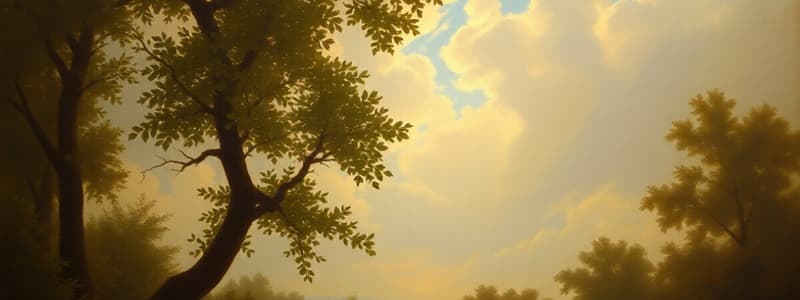Podcast
Questions and Answers
What best characterizes the state of nature according to Locke?
What best characterizes the state of nature according to Locke?
- A theoretical condition emphasizing liberty constrained by natural law. (correct)
- A regulated society with established laws.
- A historical period where governments were absent.
- A chaotic environment where rights are disregarded.
Which right is NOT considered fundamental in Locke's state of nature?
Which right is NOT considered fundamental in Locke's state of nature?
- The right to education (correct)
- The right to liberty
- The right to property
- The right to life
What is a significant limitation of the state of nature in Locke's view?
What is a significant limitation of the state of nature in Locke's view?
- All individuals are compelled to act justly at all times.
- Disputes cannot be peacefully resolved due to lack of established laws. (correct)
- There is a recognized authority to enforce laws.
- Individuals have absolute authority.
What motivates individuals to leave the state of nature according to Locke?
What motivates individuals to leave the state of nature according to Locke?
Which of the following statements captures Locke's view on equality in the state of nature?
Which of the following statements captures Locke's view on equality in the state of nature?
How does Locke believe individuals derive their natural rights?
How does Locke believe individuals derive their natural rights?
What role does natural law play in Locke's philosophy?
What role does natural law play in Locke's philosophy?
In Locke's view, what is the consequence of individuals acting outside of natural law?
In Locke's view, what is the consequence of individuals acting outside of natural law?
Flashcards
Locke's State of Nature
Locke's State of Nature
A theoretical idea where individuals are free from government, but bound by natural law, emphasizing liberty and inherent rights.
Natural Law
Natural Law
Inherent rights and rules based on reason and God, guiding individuals towards just actions and respecting each other's rights.
Right to Life
Right to Life
A fundamental right in Locke's state of nature, guaranteeing the preservation of one's existence.
Right to Liberty
Right to Liberty
Signup and view all the flashcards
Right to Property
Right to Property
Signup and view all the flashcards
Limitations of State of Nature
Limitations of State of Nature
Signup and view all the flashcards
Equality in State of Nature
Equality in State of Nature
Signup and view all the flashcards
Leaving the State of Nature
Leaving the State of Nature
Signup and view all the flashcards
Study Notes
Locke's State of Nature
- Locke's concept of the state of nature is a theoretical construct, not a historical description of a real historical period.
- In Locke's view, the state of nature is a state of liberty, where individuals are free to act according to natural law.
- Individuals are not subject to the arbitrary will of another.
- This liberty, however, is not a license to do whatever one pleases. It is constrained by natural law.
Natural Law
- Natural law, in Locke's philosophy, dictates that all individuals possess inherent rights, including the right to life, liberty, and property.
- This natural law, derived from reason and God, provides a framework for behavior.
- Individuals are obligated to respect the rights of others.
- Individuals have a right to self-preservation, including the right to defend their life, liberty, and property against those who infringe on those rights.
Fundamental Rights
- Locke's concept of the state of nature centers around fundamental rights, which pre-exist any government.
- These include the right to life, the right to liberty, and the right to property.
- The right to life emphasizes self-preservation.
- The right to liberty entails freedom from arbitrary power and interference from others.
- The right to property signifies the ability to own and control one's possessions.
Limitations of the State of Nature
- Although the state of nature is characterized by liberty, it is not without its limitations.
- The absence of a recognized authority to adjudicate disputes and enforce laws can lead to instability.
- It can result in conflict and the potential for violence.
- The lack of established laws can make it difficult to resolve disputes peacefully.
- Individuals may not always act justly or in accordance with natural law.
Equality in the State of Nature
- Locke emphasizes the equality of all individuals within the state of nature.
- No one individual possesses inherent authority over another.
- All individuals are born free and equal, endowed with natural rights.
- Individuals have equal rights and equal obligations to respect the natural law.
Justifications for Leaving the State of Nature
- Locke posits that individuals voluntarily leave the state of nature to form a civil society.
- This move is not driven by fear, but rather by a reasoned choice to improve their lives in a more secure and certain manner.
- The potential for conflict and violence in the state of nature outweighs the liberties enjoyed.
- A primary incentive for leaving the state of nature is the establishment of a government to adjudicate disputes and enforce laws fairly.
Studying That Suits You
Use AI to generate personalized quizzes and flashcards to suit your learning preferences.




